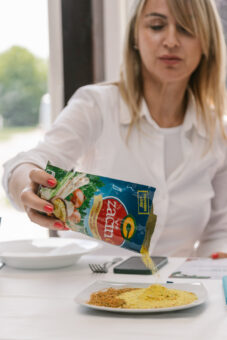
By launching initiatives aimed at achieving a net zero emission rate by 2050 in the countries in which it operates, Nestlé has been actively fighting climate change. In 2010, the company pledged to fight against deforestation. Thanks to their socially responsible and educational campaigns, such as the 2020 campaign called “Nestlé Saves Nature”, they have been drawing the public’s attention to the importance of responsible water and plastic use and waste management, with a special focus on the proper management of food surpluses. We spoke with Milica Milanović, Corporate Affairs Manager at Nestlé Adriatic, about the support that this company provides in the preservation of natural resources.
EP: Estimates show that two million kilogrammes of food are thrown away in Serbia every day, and it is currently more profitable to destroy expired food instead of donating it because you don’t have to pay VAT if the food is destroyed. In 2021 and 2022, Nestlé donated more than 70 million dinars worth of its products to vulnerable groups throughout Serbia through various charity activities and campaigns. Does social responsibility come before profit?
Milica Milanović: They are inseparable. Today, no brand can be profitable if it doesn’t win over consumer trust, and the trust is built by investing in the preservation of the community. The quantity of wasted and destroyed food is huge, which directly impacts CO₂ emissions, while about half a million people in our country live on the edge of poverty. Something is not right. As part of the general circular business model, we have established a system that manages excess products. In cooperation with food banks and other organizations throughout Serbia, we regularly donate our products to vulnerable groups. However, the paradox is that charity has become expensive, so small producers, despite empathy, cannot afford to give gifts but instead have to destroy their products. On VAT on donations, we have been working with our industry peers – the Responsible Business Forum and the Chamber of Commerce and Industry of Serbia. Recently, the Ministry of Agriculture, Forestry and Water Management organized a panel discussion where we talked about this important topic. Everyone is aware that a change in regulation is necessary, and I believe that it will happen in the coming period.
IN FOCUS:
- WASTEWATER TREATMENT AND PRESERVATION OF FRESH WATER SOURCES
- CHARGE&GO IS EXPANDING THE CHARGING NETWORK
- WWF IS LOOKING FOR CREATIVE PROJECT IDEAS FROM THE CIVIL SECTOR
EP: Nestlé supports 500,000 farmers worldwide in implementing regenerative agriculture. In Serbia, in 2021 and 2022, Nestlé invested 140,000 Swiss francs in local production processes carried out in line with the regenerative agriculture principles. How does this work, and what exactly is regenerative agriculture?

Milica Milanović: Regenerative agriculture practices, which, among other things, include afforestation, reduced tillage and planting of cover crops, have recently been implemented in our country, thanks to the programme that Nestlé implements globally with its suppliers. The companies Telek Paprika and Geneza from Kanjiža, the largest suppliers of vegetables used in our famous Začin C (Spice C), have been using organic fertilizer instead of artificial one since last year, thus protecting the soil from erosion with rows of trees and planting different crops to get better yields and healthier vegetables, but also to preserve natural resources for future generations. Soil rich in organic carbon is more fertile, has greater biodiversity and is a better water filter, improving surface and groundwater quality. Regenerative agriculture practices simultaneously bring positive economic effects, resilience to climate instability, and prosperity to agricultural communities. Globally speaking, by 2025, Nestlé will have invested 1.2 billion Swiss francs in implementing regenerative agriculture to reach zero greenhouse emissions by the same year. It is interesting to note that, despite people initially thinking that production is responsible for most of our emissions, close to 70 per cent of greenhouse gas emissions come from agricultural activities of our suppliers, i.e. before a raw material even reaches Nestlé. Nevertheless, we assess our influence through the entire supply chain. By recognizing agriculture as a key segment, we decided to invest in our suppliers so that they can continue to apply regenerative agriculture independently over time.
EP: Your new plant-based food factory in Surčin will adhere to the latest environmental standards in the industry, will use renewable energy produced by hydro-power plants, will not generate municipal waste and will treat wastewater immediately in its own wastewater treatment facility. When is the factory going to be commissioned?
Milica Milanović: The factory’s construction is going according to plan, and we are nearing its end. We expect the start of production in the first half of next year. The same standards of sustainability that you mentioned earlier and that we apply in our existing plant in Surčin will also apply to this factory. Nestlé is the first food company to reach the goal of producing zero waste for landfills, which means that it does not send a single ounce of waste to landfills, but rather recycles it or uses it for other practical purposes, such as the production of fertilizers, biofuel or eco-insulation boards. The new plant will produce meals from the Nestlé Garden Gourmet range, which are an adequate substitute for meat in terms of their nutritional value.
Interviewed by: Milica Marković
Read the story in the new issue of the Energy portal Magazine RESPONSIBLE BUSINESS.



